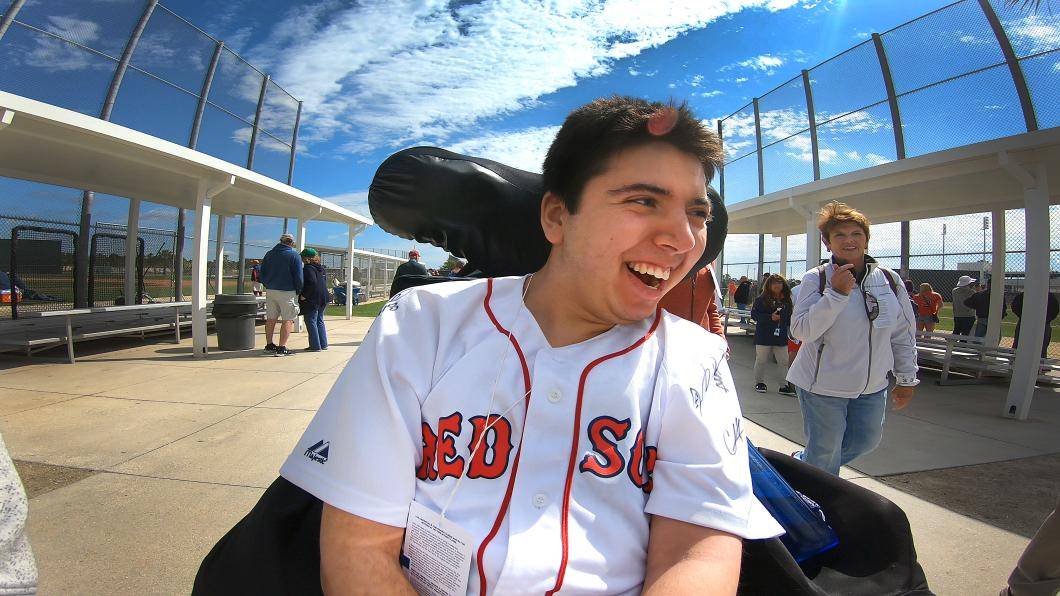‘The Ride Ahead’ is about finding power in community


By Louise Kinross
Samuel Habib is a 24-year-old New Hampshire college student who wants to date. He drives a 350-pound wheelchair and has laboured speech, so dictating what he wants to say to someone who types it into his voice device is painstaking. “I want to figure out how to follow my dreams, but nobody tells you how to be an adult, let alone an adult with a disability,” he says. In The Ride Ahead, a film premiering at Hot Docs April 28 and 30, Samuel crosses the United States with his dad Dan Habib to interview disability activists on how to navigate an ableist world. Samuel is co-director with his father. Go-Pro cameras attached to his wheelchair give novel perspectives.
BLOOM: One of my favourite pieces of advice in the film comes from comedian Maysoon Zayid. She said ‘Accept the fact that you are disabled and figure out how to work with it rather than working against it.’ What does that mean in your life? Have you ever worked against your disability?
Samuel Habib: The only thing I don’t like about having a disability is that sometimes people talk to me like I’m a three-year-old. And my GNAO1 neurodevelopmental disorder has made it more difficult to drive my chair by myself and use my communication device. But I’m proud to be a part of the disability community and I have an awesome team of support people every day. The biggest challenge for me is getting into the homes of my friends and family members. Sometimes I also get too tired to stay up late, so I miss out on going to bars, parties and dates at night.
BLOOM: Why did you make The Ride Ahead?
Samuel Habib: Disabled people should have their voices heard and we should be able to tell our own stories. As someone who struggles to communicate, this film is incredibly meaningful to me because it is making my experience visible and it is getting mine and others’ voices heard.
BLOOM: What do you want audiences to take away from this film?
Samuel Habib: Young people with disabilities who have seen the film so far have told me that they have the same questions as I do about dating, sex, moving out of their own family’s home, how to respond when people talk down to them, work, and college. That means a lot to me.
My goal for the film is that people won’t talk down to disabled people. I want everyone to know that disabled people demand respect and rights. I want other young adults with disabilities to have the same opportunities that I’ve had for health care, inclusive education, college, assistive technology, jobs, making friends, advocacy and independent living.
This film will help people understand how to talk to me and other people with communication challenges. Be patient and do not talk down to me. Ask me how I best communicate. Slow down the pace of the conversation to create more space for me to contribute. If you don’t understand me, ask me to repeat what I said. If I’m typing on my device, don’t start another conversation—please wait for me to finish.
BLOOM: What was most challenging about creating the film?
Samuel Habib: Setting up and getting all of the interviewing done. We had to fly or drive a long way for the interviews. On our flight to Indianapolis, they turned my power wheelchair on its side both ways, and it got damaged both ways. On our trip to DC we had a six-hour flight delay, and then as we were finally boarding our plane, another passenger talked down to me, like I was a three-year-old. I wanted to curse at her but I didn’t. On our New York City trip I had a seizure. But we still got the filming done on all the trips.
BLOOM: You have a close relationship with your father. What role does he play in your life?
Samuel Habib: My life is very intertwined with my parents, so they are very aware of my deeply personal things. I love to travel, so my favourite part of making the film was going around the country with my dad, seeing new places, filming with my GoPros, and meeting all of these cool adults with disabilities.
My dad and I make a good team. We spend a lot of time together, and he doesn’t embarrass me too much. I definitely get my outgoing nature from my dad. He’s one of those people that knows everyone. It’s a relief to have him do all the small talk, that’s really not my jam.
BLOOM: One of the painful parts of the film was when disability justice and queer rights advocate Lydia X. Z. Brown said they were excited to make friends at college, but that didn’t happen, despite their best efforts. Were you surprised that they said they’ve never had a close relationship with someone who wasn’t disabled?
Samuel Habib: I was surprised. My best friends [growing up] were not physically disabled, but they did not care about my disability. I have lived in Concord, New Hampshire my whole life. The Concord schools were inclusive. So actually, I’ve had a lot of friends that have disabilities, especially in high school, playing Unified soccer, basketball, and track. But my best friends do not have disabilities. At least not visible disabilities. Some have mental health challenges or learning disabilities.
In addition to Maysoon and Lydia, Samuel interviews the late disability activist Judy Heumann, hip hop artist Keith Jones, Special Olympics marathon runner Andrew Peterson, actor Ali Stroker, and Bob Williams, a key advisor on the Americans with Disabilities Act. The cool animation in the film was done by autistic animators Soul Proprietor. Learn more at The Ride Ahead. Like this content? Sign up for our monthly BLOOM e-letter, follow @LouiseKinross on Twitter, or watch our A Family Like Mine video series.
















Leave a comment